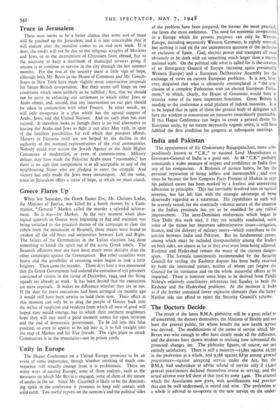Truce in Jerusalem
There now seems to be a better chance that some sort of truce will be patched up for Jerusalem, and it is just conceivable that it will endure after the mandate comes to an end next week. If it does, the credit will not be due to the religious scruples of Moslems and Jews, or to the intervention of Christians from abroad, but to the necessity to keep a minimum of municipal services going if anyone is to continue to survive in the city through the hot summer months. For the rest of the country there is little sign of hope, although both Mr. Bevin in the House of Commons and Mr. Creech- Jones in New York have made slightly more constructive proposals for future British co-operation. But their terms still hinge on two conditions which seem unlikely to be fulfilled ; first, that we should not be party to enforcing any settlement to which either Jews or Arabs object, and, second, that any intervention on our part should be taken in conjunction with other Powers. In other words, we will only co-operate in a plan which has the agreed support of Arabs, Jews, and the United Nations. And no such plan has ever existed. It therefore looks as though there is no real alternative to leaving the Arabs and Jews to fight it out after May 15th, in spite of the limitless possibilities for evil which that prospect affords. Matters in Palestine itself are not helped by the decline in the authority of the nominal representatives of the rival communities. Nobody could ever accuse the Jewish Agency or the Arab Higher Committee of moderation, or even of common-sense. Military defeats may have made the Palestine Arabs more "reasonable," but there is no sign that compromise is at all acceptable to any of the neighbouring States who are pledged to enter the struggle. And victory has only made the Jews more intransigent. All the same, truce in Jerusalem offers a straw of hope, at which we must clutch.


































 Previous page
Previous page